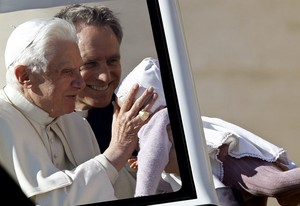Pope Benedict XVI: November 2010 Archives
If you want to know what Pope Benedict XVI really said about AIDS and condom use, you will want to read Chapter 11, of Peter Seewald's interview of the Pope in Light of the World, "The Journeys of a Shepherd," pages 117-119:
 On the occasion of your trip to Africa in March 2009, the Vatican's policy on AIDs once again became the target of media criticism. Twenty-five percent of all AIDs victims around the world today are treated in Catholic facilities. In some countries, such as Lesotho, for example, the statistic is 40 percent. In Africa you stated that the Church's traditional teaching has proven to be the only sure way to stop the spread of HIV. Critics, including critics from the Church's own ranks, object that it is madness to forbid a high-risk population to use condoms.
On the occasion of your trip to Africa in March 2009, the Vatican's policy on AIDs once again became the target of media criticism. Twenty-five percent of all AIDs victims around the world today are treated in Catholic facilities. In some countries, such as Lesotho, for example, the statistic is 40 percent. In Africa you stated that the Church's traditional teaching has proven to be the only sure way to stop the spread of HIV. Critics, including critics from the Church's own ranks, object that it is madness to forbid a high-risk population to use condoms.
The media coverage completely ignored the rest of the trip to Africa on account of a single statement. Someone had asked me why the Catholic Church adopts an unrealistic and ineffective position on AIDs. At that point, I really felt that I was being provoked, because the Church does more than anyone else. And I stand by that claim. Because she is the only institution that assists people up close and concretely, with prevention, education, help, counsel, and accompaniment. And because she is second to none in treating so many AIDs victims, especially children with AIDs.
I had the chance to visit one of these wards and to speak with the patients. That was the real answer: The Church does more than anyone else, because she does not speak from the tribunal of the newspapers, but helps her brothers and sisters where they are actually suffering. In my remarks I was not making a general statement about the condom issue, but merely said, and this is what caused such great offense, that we cannot solve the problem by distributing condoms. Much more needs to be done. We must stand close to the people, we must guide and help them; and we must do this both before and after they contract the disease.
As a matter of fact, you know, people can get condoms when they want them anyway. But this just goes to show that condoms alone do not resolve the question itself. More needs to happen. Meanwhile, the secular realm itself has developed the so-called ABC Theory: Abstinence-Be Faithful-Condom, where the condom is understood only as a last resort, when the other two points fail to work. This means that the sheer fixation on the condom implies a banalization of sexuality, which, after all, is precisely the dangerous source of the attitude of no longer seeing sexuality as the expression of love, but only a sort of drug that people administer to themselves. This is why the fight against the banalization of sexuality is also a part of the struggle to ensure that sexuality is treated as a positive value and to enable it to have a positive effect on the whole of man's being.
There may be a basis in the case of some individuals, as perhaps when a male prostitute uses a condom, where this can be a first step in the direction of a moralization, a first assumption of responsibility, on the way toward recovering an awareness that not everything is allowed and that one cannot do whatever one wants. But it is not really the way to deal with the evil of HIV infection. That can really lie only in a humanization of sexuality.
Are you saying, then, that the Catholic Church is actually not opposed in principle to the use of condoms?
She of course does not regard it as a real or moral solution, but, in this or that case, there can be nonetheless, in the intention of reducing the risk of infection, a first step in a movement toward a different way, a more human way, of living sexuality.
The Pope released his post-synodal Apostolic Exhortation, Verbum Domini, following the 2008 Synod of Bishops on the Word of God. It's available in eight languages in at least 200 pages.
Verbum Domini - English
Verbum Domini - Italiano
Verbum Domini - Español
The press conference:

At midday today in the Holy See Press Office, the presentation took place of the Post-Synodal Apostolic Exhortation "Verbum Domini" of Benedict XVI, on the Word of God in the life and mission of the Church.
Today's press conference was presented by Cardinal Marc Ouellet P.S.S., prefect of the Congregation for Bishops; Archbishop Gianfranco Ravasi, president of the Pontifical Council for Culture, and Archbishop Nikola Eterovic and Msgr. Fortunato Frizza, respectively secretary general and under secretary of the Synod of Bishops.
The Apostolic Exhortation, which is dated 30 September, Memorial of St. Jerome, is the fruit of the Twelfth Ordinary General Assembly of the Synod of Bishops, which was held in Rome from 5 to 26 October 2008. The document, which has been published in Latin, Italian, English, French, Spanish, German, Portuguese and Polish, is made up of an introduction, three parts and a conclusion.
Achbishop Eterovic explained how in part one, entitled "Verbum Dei", the Pope highlights both "the fundamental role of God the Father, source and origin of the Word", and "the Trinitarian dimension of revelation". Chapter one - "The God Who Speaks" - underscores "God's will to open and maintain a dialogue with man, in which God takes the initiative and reveals Himself in various ways". It also dwells on "the Christological aspect of the Word, while at the same time underlining the pneumatological dimension". This section of the document also focuses on the relationship between the Eucharist and Tradition, and on the theme of the inspiration and truth of the Bible.
"Our Response to the God Who Speaks" is the title of chapter two of part one. "Man is called to enter into the Alliance with his God, Who listens to him and responds to his questions. To God Who speaks, man responds with the faith. The most suitable prayer is that made using the words which were revealed by God and are conserved and written in the Bible", said Archbishop Eterovic.
Chapter three has as its title "The Interpretation of Sacred Scripture in the Church". The secretary general of the Synod of Bishops explained how "Sacred Scripture should be, as the Dogmatic Constitution 'Dei Verbum' says, 'the soul of sacred theology'. ... The biblical hermeneutics of Vatican Council II must be rediscovered, also in order to avoid a certain dualism evident in secularised interpretations which could give rise to a fundamentalist and spiritualist interpretation of Holy Scripture. Correct interpretation requires complementarity in a literal and spiritual sense, a harmony between faith and reason". This chapter also examines relations between Christians and Jews, noting that they enjoy "a very special relationship ... because they share a large part of the Scriptures".
Part two of the document is entitled "Verbum in Ecclesia". Chapter one - "The Word of God and the Church" - underlines how it is thanks to the Word of God and the effect of the Sacraments "that Jesus remains contemporary to mankind in the life of the Church", said the archbishop.
"The Liturgy, Privileged Setting for the Word of God" is the title of chapter two, in which the focus turns to "the vital link between Sacred Scripture and the Sacraments, especially the Eucharist". The importance of the Lectionary is mentioned, as is that of the proclamation of the Word and the ministry of reader, with particular emphasis being laid on the preparation of the homily, a theme of great importance in this Post-Synodal Apostolic Exhortation.
Chapter three of part two concerns "The Word of God in the Life of the Church" and highlights "the importance of biblical inspiration for pastoral activity, the biblical dimension of catechesis, the biblical formation of Christians, the use of Sacred Scripture in great ecclesial gahterings, and the Word of God in relation to vocations". Attention is also given to "lectio divina and Marian prayer", said the archbishop.
Part three of the document published today has as its title "Verbum Mundo". It draws attention to "the duty of Christians to announce the Word of God in the world in which they live and work". Chapter one - "The Church's Mission to Proclaim the Word of God to the World" - explains how the Church "is oriented towards the announcement 'ad gentes', to people who do not yet know the Word, ... but also to those who have already been baptised ... but need new evangelisation in order to rediscover the Word of God".
"The Word of God and Commitment to the World" is the title of chapter two, which recalls how "Christians are called to serve the Word of God in their most needy brothers and sisters and, hence, to commit themselves in society for reconciliation, justice and peace among peoples".
Chapter three of part three is dedicated to "The Word of God and Culture". It expresses the hope "that the Bible may become better known in schools and universities and that better use may be made of the social communications media, exploiting all the modern possibilities of technology. The theme of the inculturation of Sacred Scripture is also linked to the translation and diffusion of the Bible, which must be increased", said Archbishop Eterovic.
"The Word of God and Inter-religious Dialogue" is the title of chapter four. "Having established the value and topicality of inter-religious dialogue, 'Verbum Domini' ... supplies some important guidelines concerning dialogue between Christians and Muslims, and with members of other non-Christian religions, within the framework of a religious liberty which involves not only the freedom to profess one's faith in private and in public, but also freedom of conscience; in other words, of choosing one's religion".
In the
conclusion, Archbishop Eterovic concluded his explanations, the Holy Father
reiterates his exhortation to all Christians "to become increasingly
familiar with Sacred Scripture".
Pope Benedict XVI responded to a cross section of Italian Catholic Action, on Saturday, October 31. Reportedly, there were 50,000 children, 30,000 youth and 10,000 educators of Catholic Action, who were in Rome meeting under the theme: "There Is More. We Become Great Together." WOW!!!! The Pope really takes humanity seriously; he really understands me and my desires and my limitations. One of the Q&A that I liked is the following:
Your Holiness, our teachers in Catholic Action tell us that to grow up it is necessary to learn to love, but often we fail and we suffer in our relationships, in our friendships, in our first loves. But what does it mean to love totally? How can we learn to love truly?

Benedict XVI: A great question. It is very important, I would say fundamental, to learn to love, truly to love, to learn the art of real love! In adolescence we stop before the mirror and we notice that we are changing. But if you continue to look at yourself, you will never grow up! You grow up when you do no longer let the mirror be the only truth about you but when you let your friends tell you. You will grow up if you are able to make your life a gift to others, not to seek yourselves, but to give yourselves to others: this is the school of love. This love, however, must bring you into that "more" that today shout to everyone. "There is more!" As I have already said, I too, in my youth wanted something more than what the society and the mentality of the time presented to me. I wanted to breathe pure air, above all I desired a beautiful and good world, like our God, the Father of Jesus, wanted for everyone. And I understood more and more that the world becomes beautiful and good if one knows this will of God and if the world corresponds to this will of God, which is the true light, beauty, love that gives the world meaning.

It is quite true: You cannot and must not adapt yourselves to a love reduced to a commodity to be consumed without respect for oneself or for others, incapable of chastity and purity. This is not freedom. Much of the "love" that is proposed by the media, on the internet, is not love but egoism, closure, it gives you the illusion of a moment, but it does not make you happy, it does not make you grow up, it binds you like a chain that suffocates more beautiful thoughts and sentiments, the true desires of the heart, that irrepressible power that is love and that has its maximum expression in Jesus and strength and fire in the Holy Spirit, who enflames your lives, your thoughts, your affections. Of course it demands sacrifice to live love in the true way -- without renunciation one does not find this road -- but I am certain that you are not afraid of the toil of a challenging and authentic love. It is the only kind that, in the final analysis, gives true joy! There is a test that tells you whether your love is growing in a healthy way: If you do not exclude others from your life, above all your friends who are suffering and alone, people in difficulty, and if you open your heart to the great friend Jesus.

Catholic Action also teaches you the roads to take to learn authentic love: participation in the life of the Church, of your Christian community, loving your friends in the Children's Catholic Action group, in Catholic Action, availability to those of your age at school, in the parish or in other environments, the company of the Mother of Jesus, Mary, who knows how to guide your heart and lead you along the way of good. Moreover, in Catholic Action, you have many examples of genuine, beautiful, true love: Blessed Pier Giorgio Frassati, Blessed Alberto Marvelli; love that also leads to the sacrifice of one's life, like with Blessed Pierina Morosini and Blessed Antonia Mesina.
Young people of Catholic Action, aspire to big goals, because God gives you the strength. "More" is being young people and children who decide to love like Jesus does, to be the protagonists of our own lives, protagonists in the Church, witnesses of the faith to those who are your age. "More" is the
 human and Christian formation that
you experience in Catholic Action, which unites spiritual life, fraternity,
public witness to the faith, ecclesial communion, love for the Church,
collaboration with the bishops and priests, spiritual friendship. "Growing
up together" speaks of the importance of being part of a group and a
community that helps you to grow, to discover your vocation and to learn true love.
Thank you.
human and Christian formation that
you experience in Catholic Action, which unites spiritual life, fraternity,
public witness to the faith, ecclesial communion, love for the Church,
collaboration with the bishops and priests, spiritual friendship. "Growing
up together" speaks of the importance of being part of a group and a
community that helps you to grow, to discover your vocation and to learn true love.
Thank you.
 You & me, all Christians and people of good will ought to have a habit of prayer, of turning to God because prayer has the effect of naturalizing and lifting the soul beyond the temporal. Join me in praying for these two intentions given by the Pope to us when we turn to God.
You & me, all Christians and people of good will ought to have a habit of prayer, of turning to God because prayer has the effect of naturalizing and lifting the soul beyond the temporal. Join me in praying for these two intentions given by the Pope to us when we turn to God.
